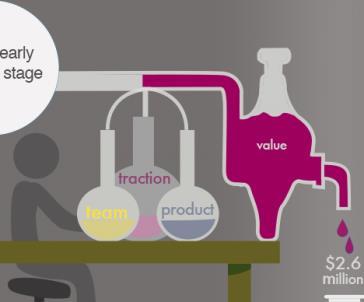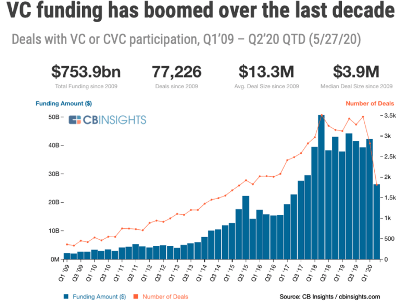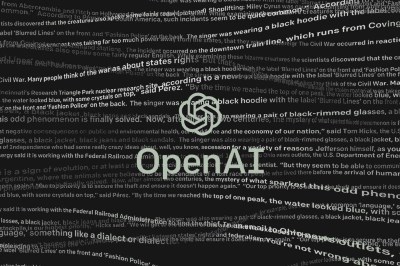Jeremie Averous's Blog, page 16
March 13, 2021
How Start-Up Founders Too Often Define Themselves by How Much Money They Raised
Start-up founders and repeat entrepreneurs often define themselves by stating how much money they raised. That’s great, but what about the sustainable value you actually created?

In the start-up ecosystem one encounters very often founders launching new ventures and boasting about how they previously managed to raise millions on earlier ventures. And that’s about the only way they define themselves. This of course proves that they are excellent sellers for their ideas and at least that they have experience in this part of the start-up adventure. But what about building a sustainable business?
If someone presents himself thus, I will certainly assume that all their previous ventures have been failures, and that they are good at raising and spending money, but with little result in terms of sustainable value. Founders that boast how much they sold a previous venture are better in that they demonstrate their ability to create something valuable and to be able to exit, which is far more reassuring.
Really, we don’t care how much you raised in your previous ventures. What we care about is if you spent the money wisely to build something durable and sustainable. Stop boasting about how much money you raised!
This is a short series of posts where I want to share some thoughts from my experience as a Business Angel with now about 15 investments over the last 5 years, and review of 100s of start-up pitches per year. Previous posts include ‘How Early Start-Up Valuation is too Often too High‘.
The post How Start-Up Founders Too Often Define Themselves by How Much Money They Raised first appeared on The Fourth Revolution Blog.
March 11, 2021
How Early Start-Up Valuation is too Often too High
In a short series of posts I want to share some thoughts from my experience as a Business Angel with now about 15 investments over the last 5 years, and review of 100s of start-up pitches per year. The first aspect I want to tackle is company valuation. Valuation for a start-up at early stage is guesswork, but my point is that often the valuations proposed are difficult to justify with a reasonable business plan. They are too high and thus make it difficult for the business angel to get proper value for his money taking into account the risk involved.

As a caveat, the start-ups I invest in are usually in the physical world, aiming to produce products or services in support of industrial production. In this context, exponential growth may happen but scaling can be expected to be slower.
Valuations are often a guesswork by founders, based on the share they accept to leave to investors, how much time they invested, their own ego and only sometimes business plan considerations. I often see excessive valuations for early start-ups with barely a workable Proof of Concept and no or very limited market feedback (in this I mean actually having sold something to a client – free trials don’t count).
The number founders arrive to is often dictated by the fact they don’t want to be too diluted, but if they want to raise serious money and give out only 10% of their capital, the resulting valuation will be very difficult to actually reach within the 5-7 years of investor commitment – and sometimes even when the company will reach its first development stage.
My experiences makes me increasingly weary about early stage valuation. Founders need to be reasonable even if this means a bit more dilution – they can’t be replaced anyway, and well, everything should be able to win something at the end.
The post How Early Start-Up Valuation is too Often too High first appeared on The Fourth Revolution Blog.
March 9, 2021
How Venture Capital Can Destroy Sustainable Innovation
This excellent NewYorker article ‘How Venture Capitalists Are Deforming Capitalism‘ reinforces the fact that Venture Capitalism can have some really bad sides. The point made here is that they can pour so much money in a specific venture that it inflates it, dominating the market, while not being sustainable, crushing other more sustainable alternatives in the process.

The article develops particularly the case of WeWork and how it crushed the market of co-working spaces thanks to an almost unlimited access to capital, therefore allowing the company to buy premium space and rent it out very cheaply. Competitors could not follow suit: “No one could make money at these prices. But they kept lowering them so that they were cheaper than everyone else. It was like they had a bottomless bank account that made it impossible for anyone else to survive“.
The problem here is that there is an assumption that if you capture quickly the entire market, then you can become very profitable. The public promise is that you will generate sufficient scale- and network-efficiency to create extreme value that will benefit everyone; the nasty and less publicized side of it is that if you crush competition you can exploit a monopoly situation and increase prices in the future. There is a fine line between both situations and it is not always obvious which side is really sought by large, well funded start-ups.
The article is quite pessimistic: “The V.C. industry has grown exponentially since Perkins’s heyday, but it has also become increasingly avaricious and cynical. It is now dominated by a few dozen firms, which, collectively, control hundreds of billions of dollars.” Bets have increased on certain ventures, with overall limited return on capital invested. There is less personal commitment.
“A 2018 paper co-written by Martin Kenney, a professor at the University of California, Davis, argued that, thanks to the prodigious bets made by today’s V.C.s, “money-losing firms can continue operating and undercutting incumbents for far longer than previously.” In the traditional capitalist model, the most efficient and capable company succeeds; in the new model, the company with the most funding wins. Such firms are often “destroying economic value”—that is, undermining sound rivals—and creating “disruption without social benefit.””
In a world where funds are more and more readily available due to low interest rates, there may be a need to regulate excessive investments in new ventures that have poor governance and unrealistic expectations. In any case one should be wary of not finding oneself in an impossible competition with an excessively funded start-up.
For more thoughts about the limits of Venture Capital, read my previous post ‘How Venture Capitalists Don’t Really Play the Role We Believe‘
The post How Venture Capital Can Destroy Sustainable Innovation first appeared on The Fourth Revolution Blog.
March 6, 2021
How Modern Inequality is also Information Inequality
As the Fourth Revolution progresses, we can hear a lot about the rise of inequality mainly in the field of finances and income. But modern inequality is also very much – and increasingly- informational. We already discussed for example in the post ‘How the Transformation of the Press Business Model Makes Access to Quality Information More Difficult‘, but let’s take a wider view of the situation.

There are good quality news outlet out there, that try to stick to journalistic principles. They may be orientated one way or the other, and the editor may favor a certain view on things, but this is generally known as the editorial line of the media. The thing is, access to this media is increasingly paying. Be it traditional press, new news portals and edited aggregators, access increasingly requires subscription.
If you can’t afford subscriptions, or if that’s not culturally on your priority list, what does remain? Public news outlets that are free, some traditional outlets that still manage to be ad-funded, or social networks. And it is this reliance on social networks that is at the origin of quite a number of issues today such as the polarization of society and more extreme groups. Before, the newspaper was displayed to be available for all to read on crowded streets, but not any more.
Thus in the past few years, access to information inequality has grown drastically up to becoming a real societal concern. It certainly needs to be fixed more urgently than income inequality, because the situation may create substantial disruption with groups of citizens living increasingly in parallel worlds.
The post How Modern Inequality is also Information Inequality first appeared on The Fourth Revolution Blog.
March 4, 2021
How to Deal with the Upcoming Flood of AI-Generated Copywriting
Following up from our previous post about the transformation caused by AI in music, this excellent post addresses the issue of AI generated text content: ‘The internet is not ready for the flood of AI-generated text‘. As it is becoming easy for AI to generate copywriting that could pass for generated by humans, we can expect the internet to be flooded by far more text than humans can currently generate. And it is not ready to manage this flood of content!

One of the subtle ways AI generated text may take over the internet is the ability to quickly generate different versions of the text and find which is the most engaging, thus becoming increasingly better rated on platforms, and overtaking human-generated text. In a world where what matters is to grab attention, this could easily become a discriminating factor.
“Technologies such as GPT-3 may dramatically impact the world of misinformation and disinformation, creating an infinite supply of fake news” – and in the process creating more inequality between those that can pay to have access to quality-vetted information and the others.
What can be done? In addition to having machines that can detect machine-generated content, “One of the most obvious first steps forward, which should be put in place for every output of tools such as GPT-3 no matter or much or how little human editing was involved, is labeling of AI-generated content so that people know what they are reading.”
Welcome to a world where human-generated content will become a rarity for which we may need to pay a bit more!
The post How to Deal with the Upcoming Flood of AI-Generated Copywriting first appeared on The Fourth Revolution Blog.
March 2, 2021
How Deepfake Music Is Changing the Music Industry
In this excellent Guardian post ‘It’s the screams of the damned!’ The eerie AI world of deepfake music‘, the implications of modern AI in the field of music are detailed. It seems quite possible nowadays to imitate the voice of any singer including those of the past. And copyright laws won’t generally apply.

This implies as well of course that it is quite possible to imitate perfectly the voice of anybody, which creates at once a potential for fakeness for all sorts of voice recordings nowadays.
It is also the start of an era where the position of the artist will change, with an onus for song- and musicwriters and potentially less for singers, unless they manage to unleash emotional impact. Actually as the economy of music is moving progressively towards live performance, recordings become more and more of a commodity and artists will need to be better performing live.
An interesting point is that copyright law is different in each country. It appears that in the US there is a law “against impersonating famous people for commercial purposes” but not in the UK or in many countries. We can expect some substantial law changes to protect the unwary, artists and their heirs against usage of its voice at least for commercial purpose. Another situation where the law will have to catchup soon!
In any case AI is also upending a large part of the music industry like it is upending many other industries, and that is made easier because at the end music is only a succession of bits, which can be taught to AI. Welcome to a new world of music!
The post How Deepfake Music Is Changing the Music Industry first appeared on The Fourth Revolution Blog.
February 27, 2021
How We Need to Have Principles to Protect the Long Term
I like this Seth Godin post about having principles: ‘Principle is inconvenient‘. It reminds us that principles is helping us keeping a longer term and navigating short term temptations. It is all about the short-term vs the long-term.

“A principle is an approach you stick with even if you know it might lead to a short-term outcome you don’t prefer. Especially then. It’s this gap between the short-term and the long-term that makes a principle valuable.”
I also find that principles are a significant help against decision-making fatigue. Strong principles avoid having to use significant resources for taking certain decisions, and this keeps us the right energy to navigate through daily issues.
Be clear on your principles. They are key to the protection of your long-term impetus.
The post How We Need to Have Principles to Protect the Long Term first appeared on The Fourth Revolution Blog.
February 25, 2021
How Surrounding Yourself With the Right People is Essential to Start Something New
In this interesting post ‘Early Work‘, Paul Graham examines what is holding back people from doing great work. And he identifies that it is mainly “the fear of making something lame“, unremarkable, mediocre.

“Many great projects go through a stage early on where they don’t seem very impressive, even to their creators. You have to push through this stage to reach the great work that lies beyond. But many people don’t. Most people don’t even reach the stage of making something they’re embarrassed by, let alone continue past it. They’re too frightened even to start.”
As Paul Graham mentions there is an increasing institutional support to people starting new things (business angels, incubators…) and this is going in the right direction.
He points out interestingly however that there is another social effect that needs to be overcome: “If you try something ambitious, many of those around you will hope, consciously or unconsciously, that you’ll fail. They worry that if you try something ambitious and succeed, it will put you above them.”
The key is thus as always to surround yourself with the right people to instill the right level of confidence and get the right support to go through the ‘lame’ phase.
The post How Surrounding Yourself With the Right People is Essential to Start Something New first appeared on The Fourth Revolution Blog.
February 23, 2021
How GPS Became Irreplaceable While Free
We don’t think much anymore how miraculous the Global Positioning System GPS is. Still, it takes a lot of high technology (including relativist time corrections on satellites!) to provide us with what is now an everyday service we depend on. Actually we take it for granted when we would be quite lost without it.

Is GPS now part of the minimum infrastructure that we need as humans, like internet access? It has certainly drastically changed the way we navigate. It started as many technology before from the Cold War military efforts, but has been progressively opened to the civilian uses. For free. Until we can’t now part from it.
Let’s imagine for a minute what would happen if the system went to be fully unavailable. We are all using it one way or the other in our daily lives, and even more so in certain industries like logistics. A lot of the efficiency gains in many activities come from GPS availability.
Still this service is available for free as many services we now take for granted, as a by-product of something developed for military purpose. There is an issue about the US controlling the signal, which is being addressed by other blocks of nations that are launching their own system. This will provide redundancy. It is still amazing that something so useful is available for free.
In the Collaborative Age, a lot of the basic infrastructure becomes increasingly available for free or cheap. Maybe we should be careful not to take it too much for granted and have some backup solutions if they suddenly disappear.
The post How GPS Became Irreplaceable While Free first appeared on The Fourth Revolution Blog.
February 20, 2021
How Hardware Infrastructure Can Be Vulnerable to Hacking
This Wired article ‘How 30 Lines of Code Blew Up a 27-Ton Generator‘ exposes at length the Aurora experiment in 2007 – how a small file was able to destroy a large diesel generator hardware, demonstrating the vulnerability of hardware to hacking (also in Wikipedia ‘Aurora Generator Test‘). This shows that well thought hacking can be targeted to destroy fully non-digital hardware. What about our vulnerability now that IoT is widespread and most hardware also host a large amount of software?

I find this article worth reading because it shows that hardware destruction was carried out indirectly, analyzing ways of making it dysfunction. It requires a lot of analysis and is not straightforward, but remains impressive as it shows that is could be relatively easy to disrupt heavily the infrastructures we have come to rely on.
It demonstrates that with the right focus and willingness, hacking can have a substantial impact on hardware. This was again demonstrated as well with the famous affair of the destruction of Iranian centrifuge uranium enrichment facilities through hacking.
The scary part is with our increasingly connected hardware – cars, key house control systems – our vulnerability has probably increased many times over the situation a decade ago. There is probably something to be done to ensure that our infrastructures remain secure in the future!
The post How Hardware Infrastructure Can Be Vulnerable to Hacking first appeared on The Fourth Revolution Blog.



